Psychology Literature Review: Screen Time and Child Development
VerifiedAdded on 2022/10/19
|11
|2608
|84
Literature Review
AI Summary
This literature review examines the impact of screen time on young children, focusing on the effects of devices like smartphones, tablets, and video game consoles. The review synthesizes findings from multiple studies, including those by Radesky et al., Hale and Guan, and Robinson et al., exploring the negative consequences of excessive screen time. It highlights issues with memory, attention, language skills, and potential links to obesity and mental health problems. The studies reviewed employ diverse methodologies, including secondary source analysis, cross-sectional approaches, and surveys, to investigate the relationship between screen time and various developmental outcomes. The review also discusses parental influence and the importance of reducing screen exposure, particularly before bedtime, to mitigate negative impacts on children's physical, psychological, and emotional well-being. The review concludes by emphasizing the need for further research to understand the long-term consequences of screen time on children's development.

RUNNING HEAD: SCREEN TIME AND YOUNG CHILDREN 0
SCREEN TIME AND YOUNG CHILDREN
SCREEN TIME AND YOUNG CHILDREN
Paraphrase This Document
Need a fresh take? Get an instant paraphrase of this document with our AI Paraphraser
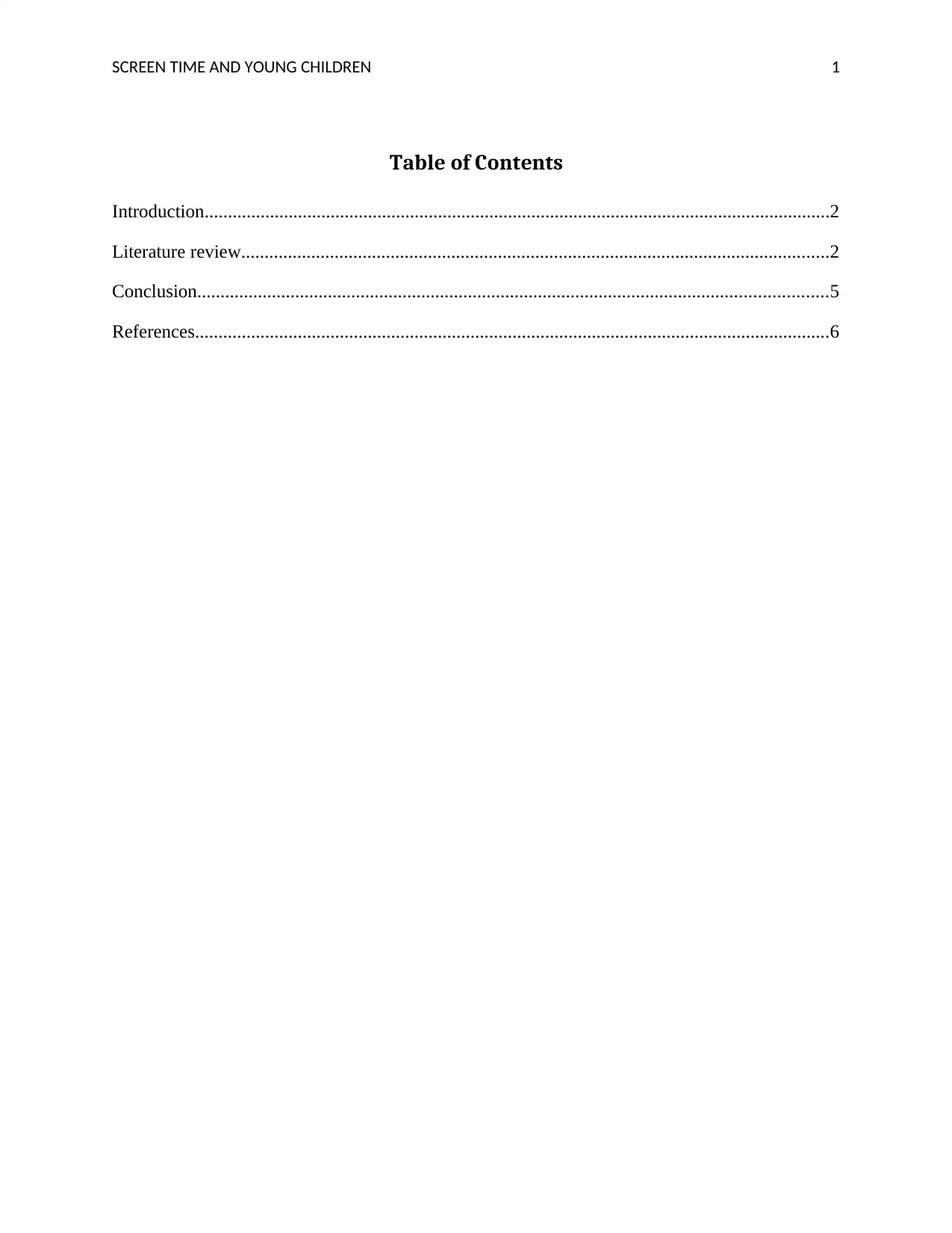
SCREEN TIME AND YOUNG CHILDREN 1
Table of Contents
Introduction......................................................................................................................................2
Literature review..............................................................................................................................2
Conclusion.......................................................................................................................................5
References........................................................................................................................................6
Table of Contents
Introduction......................................................................................................................................2
Literature review..............................................................................................................................2
Conclusion.......................................................................................................................................5
References........................................................................................................................................6
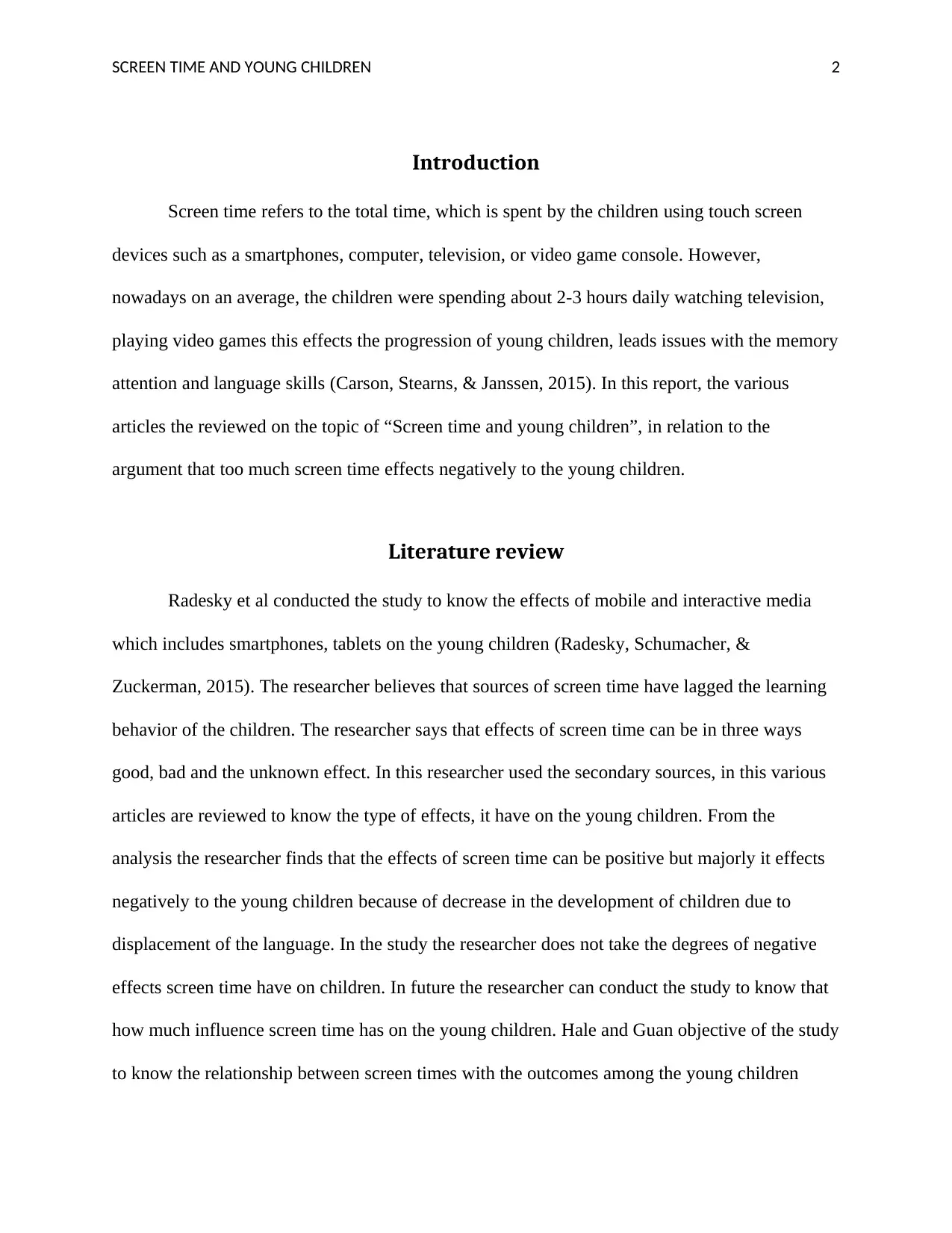
SCREEN TIME AND YOUNG CHILDREN 2
Introduction
Screen time refers to the total time, which is spent by the children using touch screen
devices such as a smartphones, computer, television, or video game console. However,
nowadays on an average, the children were spending about 2-3 hours daily watching television,
playing video games this effects the progression of young children, leads issues with the memory
attention and language skills (Carson, Stearns, & Janssen, 2015). In this report, the various
articles the reviewed on the topic of “Screen time and young children”, in relation to the
argument that too much screen time effects negatively to the young children.
Literature review
Radesky et al conducted the study to know the effects of mobile and interactive media
which includes smartphones, tablets on the young children (Radesky, Schumacher, &
Zuckerman, 2015). The researcher believes that sources of screen time have lagged the learning
behavior of the children. The researcher says that effects of screen time can be in three ways
good, bad and the unknown effect. In this researcher used the secondary sources, in this various
articles are reviewed to know the type of effects, it have on the young children. From the
analysis the researcher finds that the effects of screen time can be positive but majorly it effects
negatively to the young children because of decrease in the development of children due to
displacement of the language. In the study the researcher does not take the degrees of negative
effects screen time have on children. In future the researcher can conduct the study to know that
how much influence screen time has on the young children. Hale and Guan objective of the study
to know the relationship between screen times with the outcomes among the young children
Introduction
Screen time refers to the total time, which is spent by the children using touch screen
devices such as a smartphones, computer, television, or video game console. However,
nowadays on an average, the children were spending about 2-3 hours daily watching television,
playing video games this effects the progression of young children, leads issues with the memory
attention and language skills (Carson, Stearns, & Janssen, 2015). In this report, the various
articles the reviewed on the topic of “Screen time and young children”, in relation to the
argument that too much screen time effects negatively to the young children.
Literature review
Radesky et al conducted the study to know the effects of mobile and interactive media
which includes smartphones, tablets on the young children (Radesky, Schumacher, &
Zuckerman, 2015). The researcher believes that sources of screen time have lagged the learning
behavior of the children. The researcher says that effects of screen time can be in three ways
good, bad and the unknown effect. In this researcher used the secondary sources, in this various
articles are reviewed to know the type of effects, it have on the young children. From the
analysis the researcher finds that the effects of screen time can be positive but majorly it effects
negatively to the young children because of decrease in the development of children due to
displacement of the language. In the study the researcher does not take the degrees of negative
effects screen time have on children. In future the researcher can conduct the study to know that
how much influence screen time has on the young children. Hale and Guan objective of the study
to know the relationship between screen times with the outcomes among the young children
⊘ This is a preview!⊘
Do you want full access?
Subscribe today to unlock all pages.

Trusted by 1+ million students worldwide
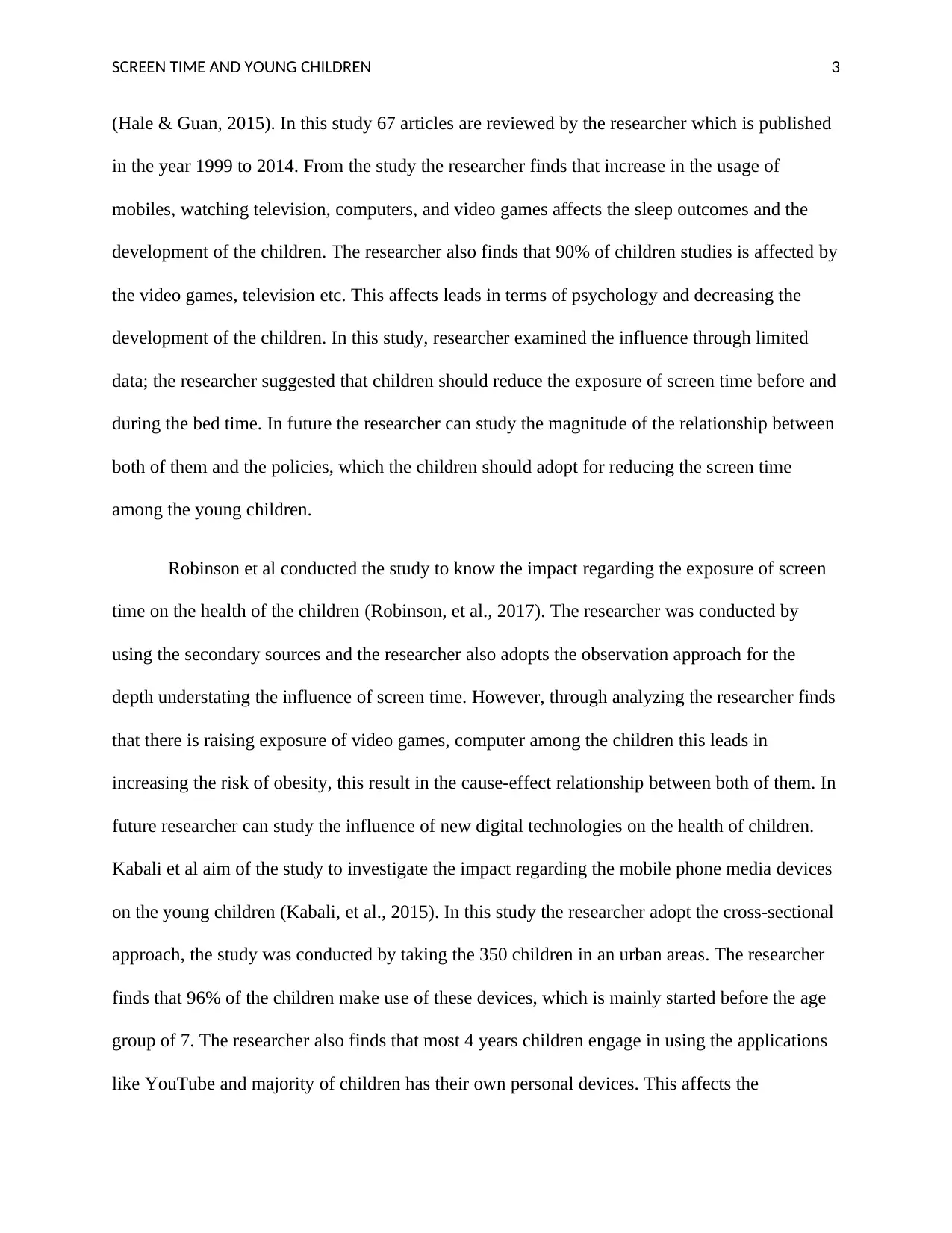
SCREEN TIME AND YOUNG CHILDREN 3
(Hale & Guan, 2015). In this study 67 articles are reviewed by the researcher which is published
in the year 1999 to 2014. From the study the researcher finds that increase in the usage of
mobiles, watching television, computers, and video games affects the sleep outcomes and the
development of the children. The researcher also finds that 90% of children studies is affected by
the video games, television etc. This affects leads in terms of psychology and decreasing the
development of the children. In this study, researcher examined the influence through limited
data; the researcher suggested that children should reduce the exposure of screen time before and
during the bed time. In future the researcher can study the magnitude of the relationship between
both of them and the policies, which the children should adopt for reducing the screen time
among the young children.
Robinson et al conducted the study to know the impact regarding the exposure of screen
time on the health of the children (Robinson, et al., 2017). The researcher was conducted by
using the secondary sources and the researcher also adopts the observation approach for the
depth understating the influence of screen time. However, through analyzing the researcher finds
that there is raising exposure of video games, computer among the children this leads in
increasing the risk of obesity, this result in the cause-effect relationship between both of them. In
future researcher can study the influence of new digital technologies on the health of children.
Kabali et al aim of the study to investigate the impact regarding the mobile phone media devices
on the young children (Kabali, et al., 2015). In this study the researcher adopt the cross-sectional
approach, the study was conducted by taking the 350 children in an urban areas. The researcher
finds that 96% of the children make use of these devices, which is mainly started before the age
group of 7. The researcher also finds that most 4 years children engage in using the applications
like YouTube and majority of children has their own personal devices. This affects the
(Hale & Guan, 2015). In this study 67 articles are reviewed by the researcher which is published
in the year 1999 to 2014. From the study the researcher finds that increase in the usage of
mobiles, watching television, computers, and video games affects the sleep outcomes and the
development of the children. The researcher also finds that 90% of children studies is affected by
the video games, television etc. This affects leads in terms of psychology and decreasing the
development of the children. In this study, researcher examined the influence through limited
data; the researcher suggested that children should reduce the exposure of screen time before and
during the bed time. In future the researcher can study the magnitude of the relationship between
both of them and the policies, which the children should adopt for reducing the screen time
among the young children.
Robinson et al conducted the study to know the impact regarding the exposure of screen
time on the health of the children (Robinson, et al., 2017). The researcher was conducted by
using the secondary sources and the researcher also adopts the observation approach for the
depth understating the influence of screen time. However, through analyzing the researcher finds
that there is raising exposure of video games, computer among the children this leads in
increasing the risk of obesity, this result in the cause-effect relationship between both of them. In
future researcher can study the influence of new digital technologies on the health of children.
Kabali et al aim of the study to investigate the impact regarding the mobile phone media devices
on the young children (Kabali, et al., 2015). In this study the researcher adopt the cross-sectional
approach, the study was conducted by taking the 350 children in an urban areas. The researcher
finds that 96% of the children make use of these devices, which is mainly started before the age
group of 7. The researcher also finds that most 4 years children engage in using the applications
like YouTube and majority of children has their own personal devices. This affects the
Paraphrase This Document
Need a fresh take? Get an instant paraphrase of this document with our AI Paraphraser
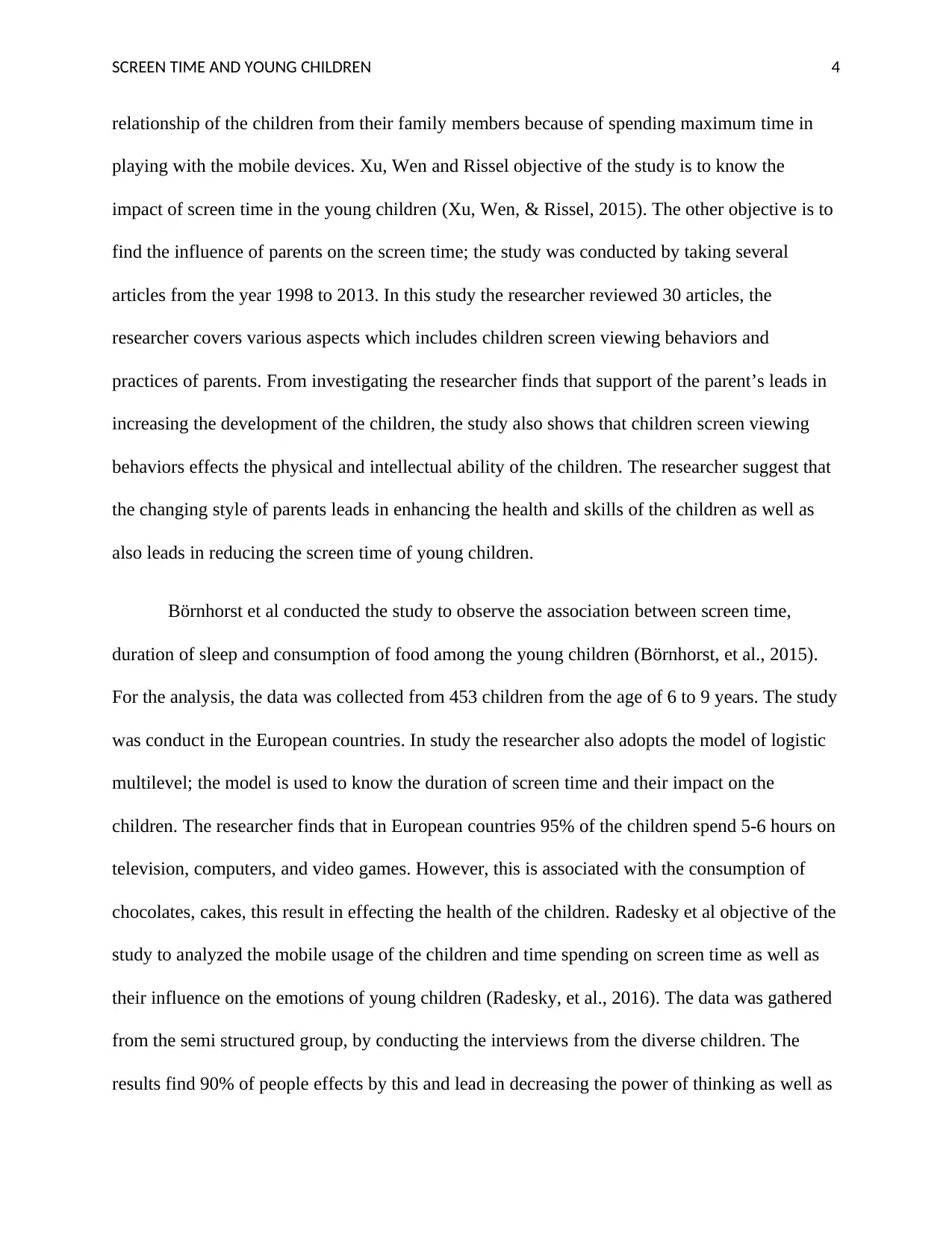
SCREEN TIME AND YOUNG CHILDREN 4
relationship of the children from their family members because of spending maximum time in
playing with the mobile devices. Xu, Wen and Rissel objective of the study is to know the
impact of screen time in the young children (Xu, Wen, & Rissel, 2015). The other objective is to
find the influence of parents on the screen time; the study was conducted by taking several
articles from the year 1998 to 2013. In this study the researcher reviewed 30 articles, the
researcher covers various aspects which includes children screen viewing behaviors and
practices of parents. From investigating the researcher finds that support of the parent’s leads in
increasing the development of the children, the study also shows that children screen viewing
behaviors effects the physical and intellectual ability of the children. The researcher suggest that
the changing style of parents leads in enhancing the health and skills of the children as well as
also leads in reducing the screen time of young children.
Börnhorst et al conducted the study to observe the association between screen time,
duration of sleep and consumption of food among the young children (Börnhorst, et al., 2015).
For the analysis, the data was collected from 453 children from the age of 6 to 9 years. The study
was conduct in the European countries. In study the researcher also adopts the model of logistic
multilevel; the model is used to know the duration of screen time and their impact on the
children. The researcher finds that in European countries 95% of the children spend 5-6 hours on
television, computers, and video games. However, this is associated with the consumption of
chocolates, cakes, this result in effecting the health of the children. Radesky et al objective of the
study to analyzed the mobile usage of the children and time spending on screen time as well as
their influence on the emotions of young children (Radesky, et al., 2016). The data was gathered
from the semi structured group, by conducting the interviews from the diverse children. The
results find 90% of people effects by this and lead in decreasing the power of thinking as well as
relationship of the children from their family members because of spending maximum time in
playing with the mobile devices. Xu, Wen and Rissel objective of the study is to know the
impact of screen time in the young children (Xu, Wen, & Rissel, 2015). The other objective is to
find the influence of parents on the screen time; the study was conducted by taking several
articles from the year 1998 to 2013. In this study the researcher reviewed 30 articles, the
researcher covers various aspects which includes children screen viewing behaviors and
practices of parents. From investigating the researcher finds that support of the parent’s leads in
increasing the development of the children, the study also shows that children screen viewing
behaviors effects the physical and intellectual ability of the children. The researcher suggest that
the changing style of parents leads in enhancing the health and skills of the children as well as
also leads in reducing the screen time of young children.
Börnhorst et al conducted the study to observe the association between screen time,
duration of sleep and consumption of food among the young children (Börnhorst, et al., 2015).
For the analysis, the data was collected from 453 children from the age of 6 to 9 years. The study
was conduct in the European countries. In study the researcher also adopts the model of logistic
multilevel; the model is used to know the duration of screen time and their impact on the
children. The researcher finds that in European countries 95% of the children spend 5-6 hours on
television, computers, and video games. However, this is associated with the consumption of
chocolates, cakes, this result in effecting the health of the children. Radesky et al objective of the
study to analyzed the mobile usage of the children and time spending on screen time as well as
their influence on the emotions of young children (Radesky, et al., 2016). The data was gathered
from the semi structured group, by conducting the interviews from the diverse children. The
results find 90% of people effects by this and lead in decreasing the power of thinking as well as
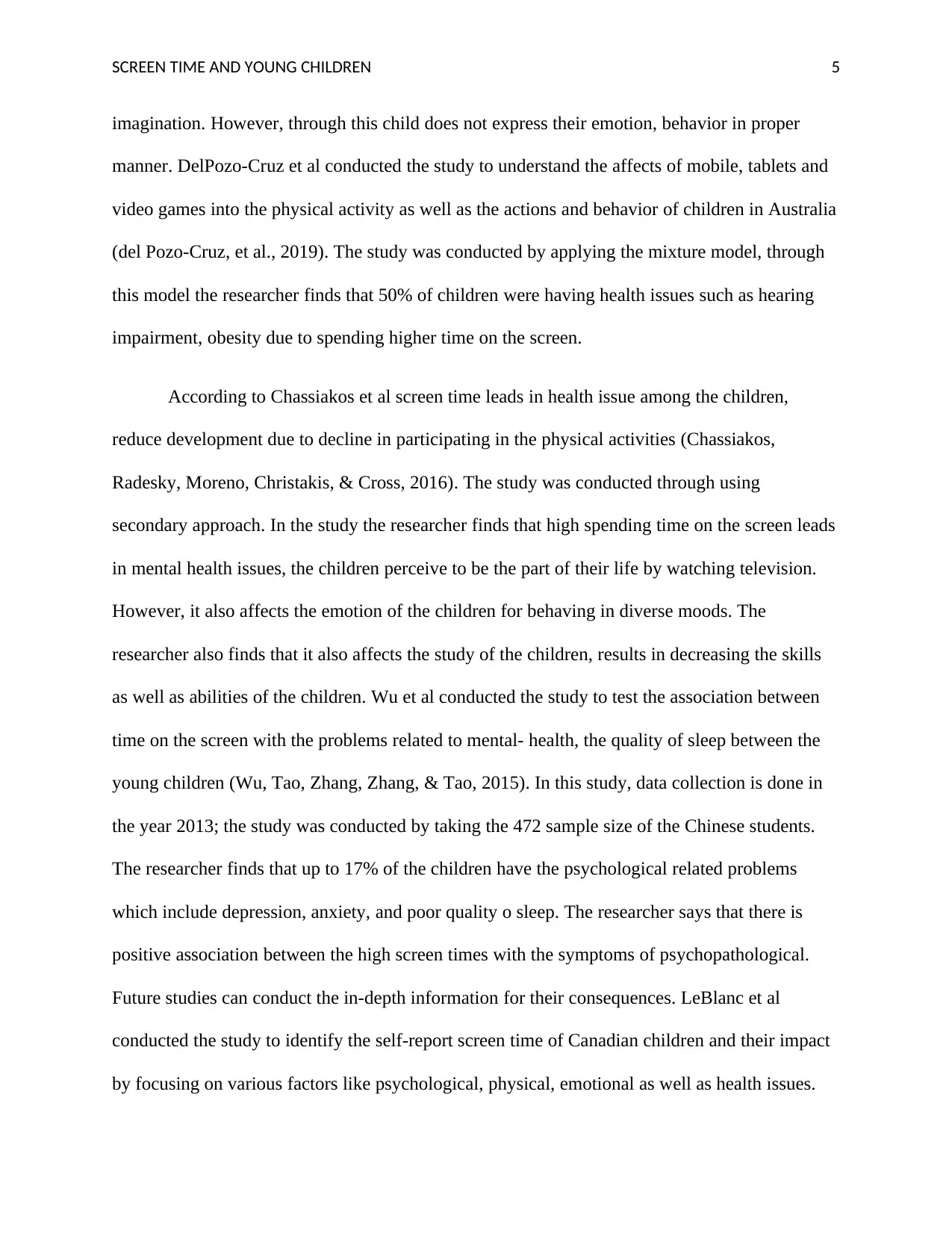
SCREEN TIME AND YOUNG CHILDREN 5
imagination. However, through this child does not express their emotion, behavior in proper
manner. DelPozo-Cruz et al conducted the study to understand the affects of mobile, tablets and
video games into the physical activity as well as the actions and behavior of children in Australia
(del Pozo-Cruz, et al., 2019). The study was conducted by applying the mixture model, through
this model the researcher finds that 50% of children were having health issues such as hearing
impairment, obesity due to spending higher time on the screen.
According to Chassiakos et al screen time leads in health issue among the children,
reduce development due to decline in participating in the physical activities (Chassiakos,
Radesky, Moreno, Christakis, & Cross, 2016). The study was conducted through using
secondary approach. In the study the researcher finds that high spending time on the screen leads
in mental health issues, the children perceive to be the part of their life by watching television.
However, it also affects the emotion of the children for behaving in diverse moods. The
researcher also finds that it also affects the study of the children, results in decreasing the skills
as well as abilities of the children. Wu et al conducted the study to test the association between
time on the screen with the problems related to mental- health, the quality of sleep between the
young children (Wu, Tao, Zhang, Zhang, & Tao, 2015). In this study, data collection is done in
the year 2013; the study was conducted by taking the 472 sample size of the Chinese students.
The researcher finds that up to 17% of the children have the psychological related problems
which include depression, anxiety, and poor quality o sleep. The researcher says that there is
positive association between the high screen times with the symptoms of psychopathological.
Future studies can conduct the in-depth information for their consequences. LeBlanc et al
conducted the study to identify the self-report screen time of Canadian children and their impact
by focusing on various factors like psychological, physical, emotional as well as health issues.
imagination. However, through this child does not express their emotion, behavior in proper
manner. DelPozo-Cruz et al conducted the study to understand the affects of mobile, tablets and
video games into the physical activity as well as the actions and behavior of children in Australia
(del Pozo-Cruz, et al., 2019). The study was conducted by applying the mixture model, through
this model the researcher finds that 50% of children were having health issues such as hearing
impairment, obesity due to spending higher time on the screen.
According to Chassiakos et al screen time leads in health issue among the children,
reduce development due to decline in participating in the physical activities (Chassiakos,
Radesky, Moreno, Christakis, & Cross, 2016). The study was conducted through using
secondary approach. In the study the researcher finds that high spending time on the screen leads
in mental health issues, the children perceive to be the part of their life by watching television.
However, it also affects the emotion of the children for behaving in diverse moods. The
researcher also finds that it also affects the study of the children, results in decreasing the skills
as well as abilities of the children. Wu et al conducted the study to test the association between
time on the screen with the problems related to mental- health, the quality of sleep between the
young children (Wu, Tao, Zhang, Zhang, & Tao, 2015). In this study, data collection is done in
the year 2013; the study was conducted by taking the 472 sample size of the Chinese students.
The researcher finds that up to 17% of the children have the psychological related problems
which include depression, anxiety, and poor quality o sleep. The researcher says that there is
positive association between the high screen times with the symptoms of psychopathological.
Future studies can conduct the in-depth information for their consequences. LeBlanc et al
conducted the study to identify the self-report screen time of Canadian children and their impact
by focusing on various factors like psychological, physical, emotional as well as health issues.
⊘ This is a preview!⊘
Do you want full access?
Subscribe today to unlock all pages.

Trusted by 1+ million students worldwide
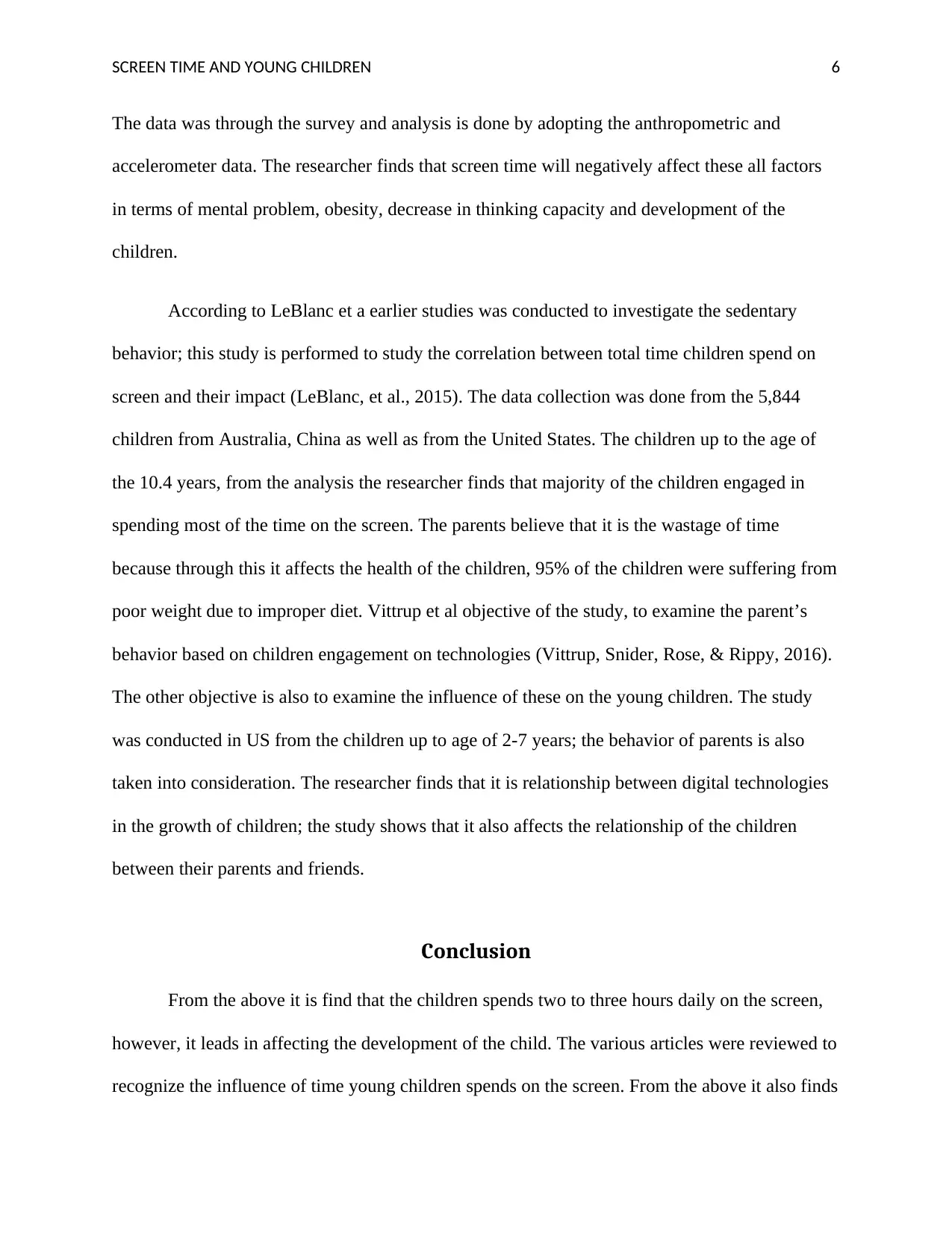
SCREEN TIME AND YOUNG CHILDREN 6
The data was through the survey and analysis is done by adopting the anthropometric and
accelerometer data. The researcher finds that screen time will negatively affect these all factors
in terms of mental problem, obesity, decrease in thinking capacity and development of the
children.
According to LeBlanc et a earlier studies was conducted to investigate the sedentary
behavior; this study is performed to study the correlation between total time children spend on
screen and their impact (LeBlanc, et al., 2015). The data collection was done from the 5,844
children from Australia, China as well as from the United States. The children up to the age of
the 10.4 years, from the analysis the researcher finds that majority of the children engaged in
spending most of the time on the screen. The parents believe that it is the wastage of time
because through this it affects the health of the children, 95% of the children were suffering from
poor weight due to improper diet. Vittrup et al objective of the study, to examine the parent’s
behavior based on children engagement on technologies (Vittrup, Snider, Rose, & Rippy, 2016).
The other objective is also to examine the influence of these on the young children. The study
was conducted in US from the children up to age of 2-7 years; the behavior of parents is also
taken into consideration. The researcher finds that it is relationship between digital technologies
in the growth of children; the study shows that it also affects the relationship of the children
between their parents and friends.
Conclusion
From the above it is find that the children spends two to three hours daily on the screen,
however, it leads in affecting the development of the child. The various articles were reviewed to
recognize the influence of time young children spends on the screen. From the above it also finds
The data was through the survey and analysis is done by adopting the anthropometric and
accelerometer data. The researcher finds that screen time will negatively affect these all factors
in terms of mental problem, obesity, decrease in thinking capacity and development of the
children.
According to LeBlanc et a earlier studies was conducted to investigate the sedentary
behavior; this study is performed to study the correlation between total time children spend on
screen and their impact (LeBlanc, et al., 2015). The data collection was done from the 5,844
children from Australia, China as well as from the United States. The children up to the age of
the 10.4 years, from the analysis the researcher finds that majority of the children engaged in
spending most of the time on the screen. The parents believe that it is the wastage of time
because through this it affects the health of the children, 95% of the children were suffering from
poor weight due to improper diet. Vittrup et al objective of the study, to examine the parent’s
behavior based on children engagement on technologies (Vittrup, Snider, Rose, & Rippy, 2016).
The other objective is also to examine the influence of these on the young children. The study
was conducted in US from the children up to age of 2-7 years; the behavior of parents is also
taken into consideration. The researcher finds that it is relationship between digital technologies
in the growth of children; the study shows that it also affects the relationship of the children
between their parents and friends.
Conclusion
From the above it is find that the children spends two to three hours daily on the screen,
however, it leads in affecting the development of the child. The various articles were reviewed to
recognize the influence of time young children spends on the screen. From the above it also finds
Paraphrase This Document
Need a fresh take? Get an instant paraphrase of this document with our AI Paraphraser

SCREEN TIME AND YOUNG CHILDREN 7
that screen time has negative effect on the children, that is it affect psychological, physical as
well as emotional aspects of the children.
References
that screen time has negative effect on the children, that is it affect psychological, physical as
well as emotional aspects of the children.
References
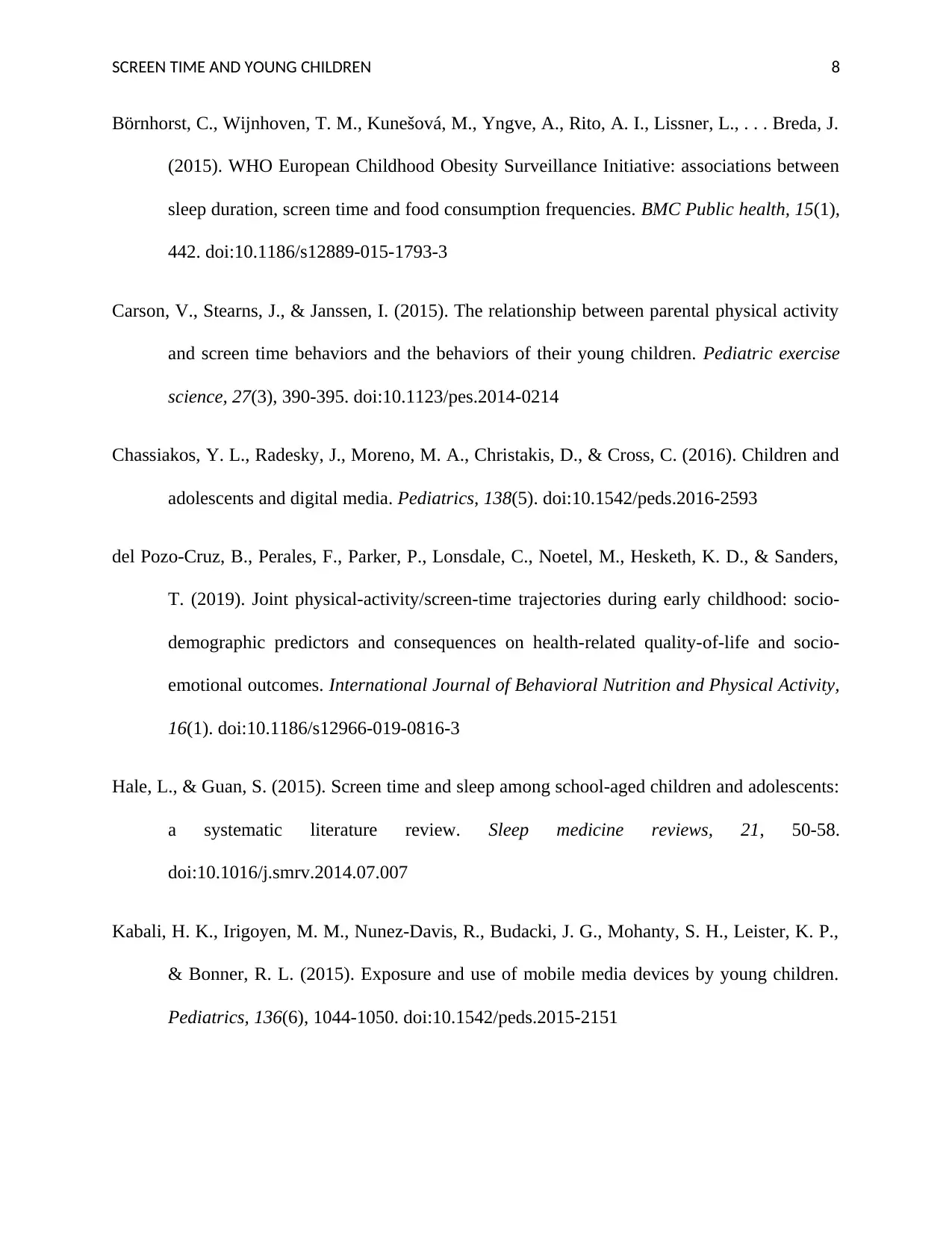
SCREEN TIME AND YOUNG CHILDREN 8
Börnhorst, C., Wijnhoven, T. M., Kunešová, M., Yngve, A., Rito, A. I., Lissner, L., . . . Breda, J.
(2015). WHO European Childhood Obesity Surveillance Initiative: associations between
sleep duration, screen time and food consumption frequencies. BMC Public health, 15(1),
442. doi:10.1186/s12889-015-1793-3
Carson, V., Stearns, J., & Janssen, I. (2015). The relationship between parental physical activity
and screen time behaviors and the behaviors of their young children. Pediatric exercise
science, 27(3), 390-395. doi:10.1123/pes.2014-0214
Chassiakos, Y. L., Radesky, J., Moreno, M. A., Christakis, D., & Cross, C. (2016). Children and
adolescents and digital media. Pediatrics, 138(5). doi:10.1542/peds.2016-2593
del Pozo-Cruz, B., Perales, F., Parker, P., Lonsdale, C., Noetel, M., Hesketh, K. D., & Sanders,
T. (2019). Joint physical-activity/screen-time trajectories during early childhood: socio-
demographic predictors and consequences on health-related quality-of-life and socio-
emotional outcomes. International Journal of Behavioral Nutrition and Physical Activity,
16(1). doi:10.1186/s12966-019-0816-3
Hale, L., & Guan, S. (2015). Screen time and sleep among school-aged children and adolescents:
a systematic literature review. Sleep medicine reviews, 21, 50-58.
doi:10.1016/j.smrv.2014.07.007
Kabali, H. K., Irigoyen, M. M., Nunez-Davis, R., Budacki, J. G., Mohanty, S. H., Leister, K. P.,
& Bonner, R. L. (2015). Exposure and use of mobile media devices by young children.
Pediatrics, 136(6), 1044-1050. doi:10.1542/peds.2015-2151
Börnhorst, C., Wijnhoven, T. M., Kunešová, M., Yngve, A., Rito, A. I., Lissner, L., . . . Breda, J.
(2015). WHO European Childhood Obesity Surveillance Initiative: associations between
sleep duration, screen time and food consumption frequencies. BMC Public health, 15(1),
442. doi:10.1186/s12889-015-1793-3
Carson, V., Stearns, J., & Janssen, I. (2015). The relationship between parental physical activity
and screen time behaviors and the behaviors of their young children. Pediatric exercise
science, 27(3), 390-395. doi:10.1123/pes.2014-0214
Chassiakos, Y. L., Radesky, J., Moreno, M. A., Christakis, D., & Cross, C. (2016). Children and
adolescents and digital media. Pediatrics, 138(5). doi:10.1542/peds.2016-2593
del Pozo-Cruz, B., Perales, F., Parker, P., Lonsdale, C., Noetel, M., Hesketh, K. D., & Sanders,
T. (2019). Joint physical-activity/screen-time trajectories during early childhood: socio-
demographic predictors and consequences on health-related quality-of-life and socio-
emotional outcomes. International Journal of Behavioral Nutrition and Physical Activity,
16(1). doi:10.1186/s12966-019-0816-3
Hale, L., & Guan, S. (2015). Screen time and sleep among school-aged children and adolescents:
a systematic literature review. Sleep medicine reviews, 21, 50-58.
doi:10.1016/j.smrv.2014.07.007
Kabali, H. K., Irigoyen, M. M., Nunez-Davis, R., Budacki, J. G., Mohanty, S. H., Leister, K. P.,
& Bonner, R. L. (2015). Exposure and use of mobile media devices by young children.
Pediatrics, 136(6), 1044-1050. doi:10.1542/peds.2015-2151
⊘ This is a preview!⊘
Do you want full access?
Subscribe today to unlock all pages.

Trusted by 1+ million students worldwide
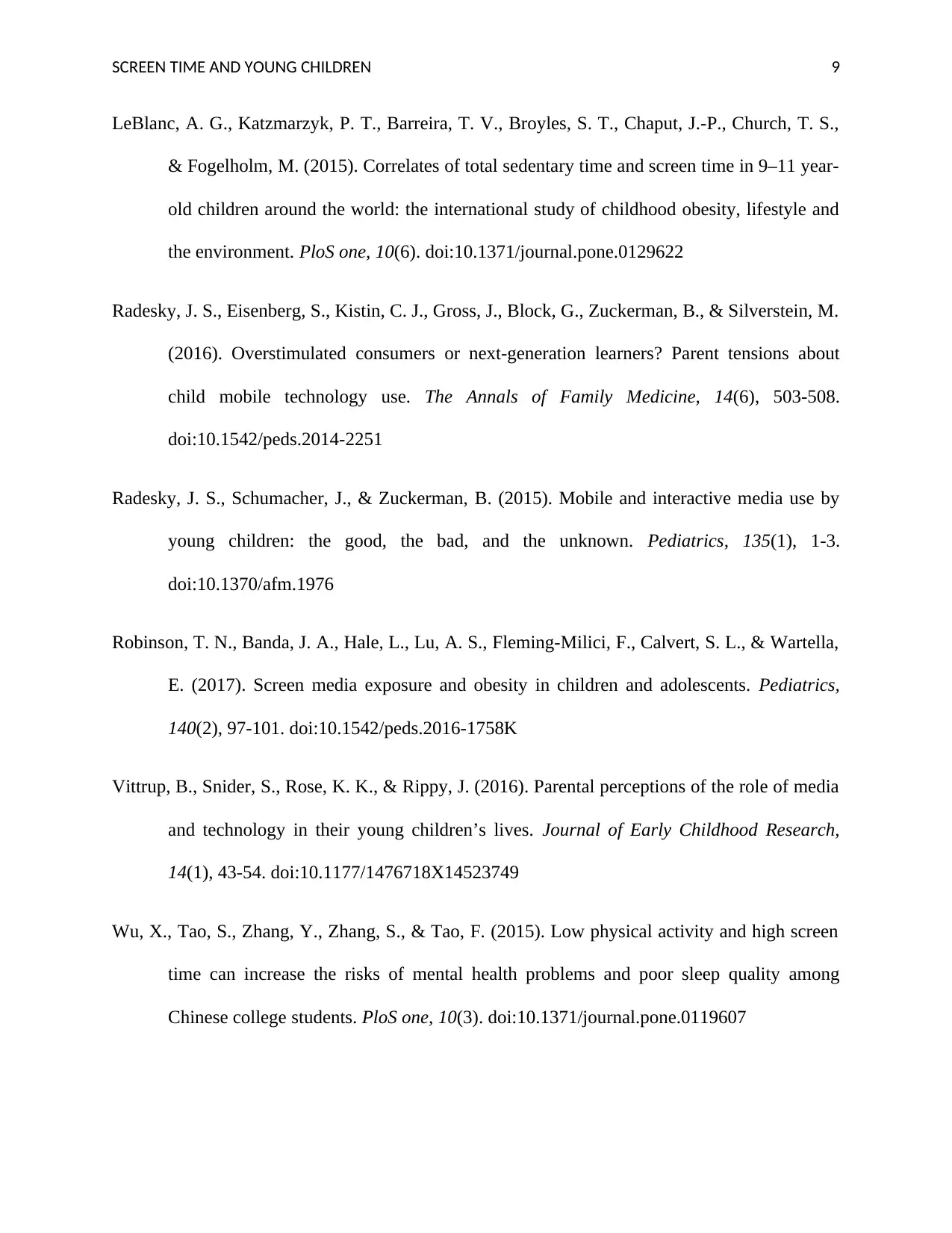
SCREEN TIME AND YOUNG CHILDREN 9
LeBlanc, A. G., Katzmarzyk, P. T., Barreira, T. V., Broyles, S. T., Chaput, J.-P., Church, T. S.,
& Fogelholm, M. (2015). Correlates of total sedentary time and screen time in 9–11 year-
old children around the world: the international study of childhood obesity, lifestyle and
the environment. PloS one, 10(6). doi:10.1371/journal.pone.0129622
Radesky, J. S., Eisenberg, S., Kistin, C. J., Gross, J., Block, G., Zuckerman, B., & Silverstein, M.
(2016). Overstimulated consumers or next-generation learners? Parent tensions about
child mobile technology use. The Annals of Family Medicine, 14(6), 503-508.
doi:10.1542/peds.2014-2251
Radesky, J. S., Schumacher, J., & Zuckerman, B. (2015). Mobile and interactive media use by
young children: the good, the bad, and the unknown. Pediatrics, 135(1), 1-3.
doi:10.1370/afm.1976
Robinson, T. N., Banda, J. A., Hale, L., Lu, A. S., Fleming-Milici, F., Calvert, S. L., & Wartella,
E. (2017). Screen media exposure and obesity in children and adolescents. Pediatrics,
140(2), 97-101. doi:10.1542/peds.2016-1758K
Vittrup, B., Snider, S., Rose, K. K., & Rippy, J. (2016). Parental perceptions of the role of media
and technology in their young children’s lives. Journal of Early Childhood Research,
14(1), 43-54. doi:10.1177/1476718X14523749
Wu, X., Tao, S., Zhang, Y., Zhang, S., & Tao, F. (2015). Low physical activity and high screen
time can increase the risks of mental health problems and poor sleep quality among
Chinese college students. PloS one, 10(3). doi:10.1371/journal.pone.0119607
LeBlanc, A. G., Katzmarzyk, P. T., Barreira, T. V., Broyles, S. T., Chaput, J.-P., Church, T. S.,
& Fogelholm, M. (2015). Correlates of total sedentary time and screen time in 9–11 year-
old children around the world: the international study of childhood obesity, lifestyle and
the environment. PloS one, 10(6). doi:10.1371/journal.pone.0129622
Radesky, J. S., Eisenberg, S., Kistin, C. J., Gross, J., Block, G., Zuckerman, B., & Silverstein, M.
(2016). Overstimulated consumers or next-generation learners? Parent tensions about
child mobile technology use. The Annals of Family Medicine, 14(6), 503-508.
doi:10.1542/peds.2014-2251
Radesky, J. S., Schumacher, J., & Zuckerman, B. (2015). Mobile and interactive media use by
young children: the good, the bad, and the unknown. Pediatrics, 135(1), 1-3.
doi:10.1370/afm.1976
Robinson, T. N., Banda, J. A., Hale, L., Lu, A. S., Fleming-Milici, F., Calvert, S. L., & Wartella,
E. (2017). Screen media exposure and obesity in children and adolescents. Pediatrics,
140(2), 97-101. doi:10.1542/peds.2016-1758K
Vittrup, B., Snider, S., Rose, K. K., & Rippy, J. (2016). Parental perceptions of the role of media
and technology in their young children’s lives. Journal of Early Childhood Research,
14(1), 43-54. doi:10.1177/1476718X14523749
Wu, X., Tao, S., Zhang, Y., Zhang, S., & Tao, F. (2015). Low physical activity and high screen
time can increase the risks of mental health problems and poor sleep quality among
Chinese college students. PloS one, 10(3). doi:10.1371/journal.pone.0119607
Paraphrase This Document
Need a fresh take? Get an instant paraphrase of this document with our AI Paraphraser

SCREEN TIME AND YOUNG CHILDREN 10
Xu, H., Wen, L. M., & Rissel, C. (2015). ssociations of parental influences with physical activity
and screen time among young children: a systematic review. Journal of Obesity.
doi:10.1155/2015/546925
Xu, H., Wen, L. M., & Rissel, C. (2015). ssociations of parental influences with physical activity
and screen time among young children: a systematic review. Journal of Obesity.
doi:10.1155/2015/546925
1 out of 11
Related Documents
Your All-in-One AI-Powered Toolkit for Academic Success.
+13062052269
info@desklib.com
Available 24*7 on WhatsApp / Email
![[object Object]](/_next/static/media/star-bottom.7253800d.svg)
Unlock your academic potential
Copyright © 2020–2026 A2Z Services. All Rights Reserved. Developed and managed by ZUCOL.





